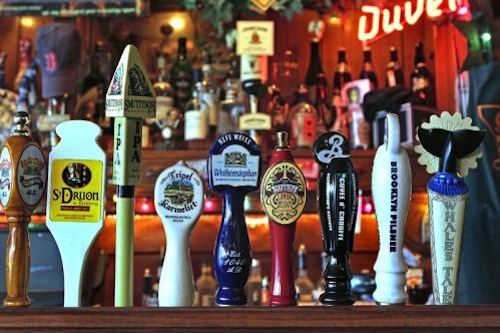 Q: Why does Boston seem to be such a good beer town and Chicago so lousy? When I go into a restaurant or bar in Chicago, 99% of the time it seems the draft list sucks. It’s either Bud, Miller, or Guinness—boring, boring, boring. In Boston, I rarely see the big domestic brands on draft. Maybe a Harpoon or Sam Adams, but the rest are interesting independent craft beers: Victory, Dogfish Head, Rogue, BBC.
Q: Why does Boston seem to be such a good beer town and Chicago so lousy? When I go into a restaurant or bar in Chicago, 99% of the time it seems the draft list sucks. It’s either Bud, Miller, or Guinness—boring, boring, boring. In Boston, I rarely see the big domestic brands on draft. Maybe a Harpoon or Sam Adams, but the rest are interesting independent craft beers: Victory, Dogfish Head, Rogue, BBC.
A: Most beer distributorships in the Midwest began as original franchises of either Miller or Bud and remain so today. Distribution originated in the early days (19th century and pre-prohibition) from German family breweries predominately based in Milwaukee (Pabst, Schlitz, Miller, Old Style) or St. Louis‘ Busch family (Bud or Griesedieck (Falstaff)). These breweries were founded by German immigrants who brought recipes from the homeland and started production to quench the thirst the immigrant working class. In fact, each local tavern in Chicago seemed to support one family brewery or another. Example: the Schlitz moniker on Schuba’s tavern, which was built by Schlitz in 1903 as a neighborhood saloon featuring Schlitz products.
Distributor families are very powerful “machines” today and have strong Illinois political connections.
I have no idea what the other major breweries and their distributors are doing in Boston. Each state has different regulations. But I bet you can enter any sports bar or Cheers–like joint in Beantown and you’ll see the “Big Three:” Bud, Coors, Miller.
Microbreweries are a fairly recent invention; the early guys, like Anchor and later Sierra Nevada, gravitated toward wine distributors or small German-based importers, like Glunz in Chicago. But most big imports like Heineken, Grolsch, and Beck’s were first distributed by a Bud or Miller franchisee.
In many ways it’s probably the same in Boston. Walk in any bar around Fenway Park and you’ll see the “Big Three” handles. The Big Three put tons of pressure on their distributor/franchisee’s to have at least one tap in every watering hole. And since most of them now carry smaller specialty beers to offer variety, the craft beers still take a back seat to the big guys.
So it really is that way in Boston, too. (Apparently you’re just going to the cool accounts in Beantown).

